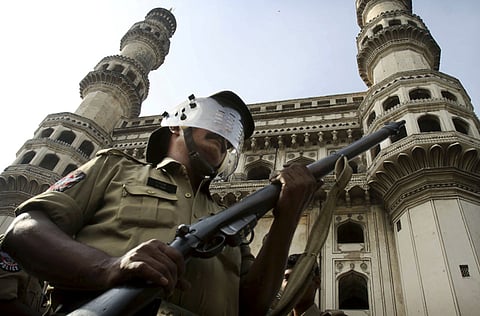Indian court orders Ayodhya site to be split among Hindus and Muslims
An Indian court delivered its verdict on the six-decade-old Ayodhya dispute ordering the site to be divided equally between Hindu and Muslim litigants

Lucknow: An Indian court Thursday delivered its verdict on the six-decade-old Ayodhya dispute ordering the site to be divided equally between Hindu and Muslim litigants.
The three-judge Lucknow bench of the Allahabad High Court also ruled that Hindus will be allowed to retain a makeshift temple built over the demolished mosque's central dome.
The verdict is not seen as final as both the Hindu and Muslim litigants have decided to move the Supreme Court for the final arbitration.
Shops were closed, streets were deserted and police were on patrol in Lucknow, where the verdict was delivered.
In India's commercial capital Mumbai — a flashpoint for previous Hindu-Muslim violence over the temple dispute — Hindu and Muslim groups appealed for peace.
Although no untoward incident was reported Thursday, Indian authorities are taking no chances.
Security forces deployed all over the country will be on guard in view of two international sporting events — the India-Australia cricket series and the 12-day Commonwealth Games.
India's Prime Minister Manmohan Singh led appeals for calm after the verdict.
"I have full faith in the people of India and I also have full confidence in the traditions of secularism, brotherhood and tolerance of our great country," Singh said.
"I know that often it is only a few mischief-makers who create divisions in our society. I would appeal to my countrymen to be vigilant and not let such people succeed in disrupting peace," he said.
"Nobody has won. Nobody has lost," Yashwant Sinha, leader of the Bharatiya Janata Party, said. "Let's not look at this as a victory for anyone."
Disappointment
Syed Ahmad Bukhari, New Delhi's leading Muslim cleric, denounced the judgment, saying the court had ruled "on the basis of blind faith and not by evidence and documentation provided to the judges."
"We are definitely not happy with the ruling," he said. "We are not giving up our claim [to rebuild] the Babri mosque."
Asaduddin Owaisi, a Muslim member of parliament, said "there is anger building up among the Muslim community over the verdict but, God willing, it may not translate into street violence."
"It was a very sensible judgment and the court has tried to balance the parties," said Anil Verma, a political analyst.
"Apportioning one-third to the Muslims means they have not completely lost."
Analysts said the verdict was unlikely to spark widespread riots that hit the financial capital Mumbai and other cities in 1992.
Many Muslim organisations expressed some disappointment but called for reconciliation, resting hopes in an appeal by Muslim lawyers to the Supreme Court in New Delhi.
"The judgment can begin a process of reconciliation," Kamal Farooqi, a member of the All India Muslim Personal Law Board, said.
Sign up for the Daily Briefing
Get the latest news and updates straight to your inbox



